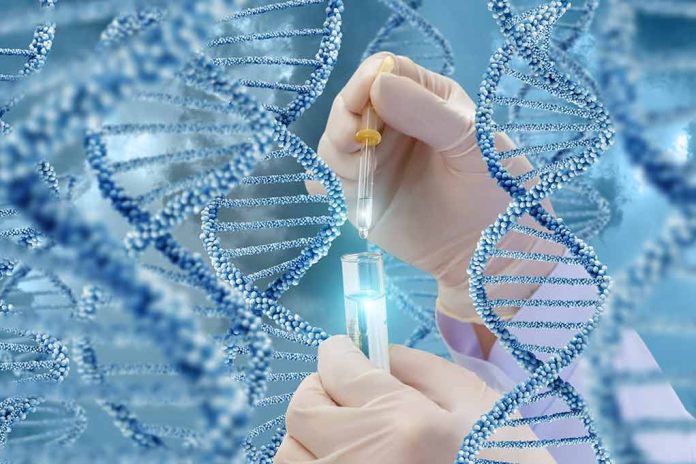🔴 Website 👉 https://u-s-news.com/
Telegram 👉 https://t.me/usnewscom_channel
Imported shrimp containing deadly colistin-resistant genes have been discovered in American markets, potentially setting the stage for untreatable bacterial infections that could ravage our healthcare system.
Key Takeaways
- Researchers at the University of Georgia have discovered colistin-resistant genes in imported shrimp and scallops purchased from Atlanta markets.
- Colistin is considered a “last-resort” antibiotic used when all other treatments fail for severe infections like pneumonia and sepsis.
- Over 90% of seafood consumed in America is imported, with many source countries having weak regulations on antibiotic use in food production.
- These resistant genes can transfer between different bacteria, potentially leading to deadly infections that cannot be treated with available antibiotics.
- Antibiotic-resistant infections already cause approximately 35,000 deaths annually in the United States, with this discovery potentially worsens the crisis.
Foreign Seafood Bringing Superbug Genes to American Tables
University of Georgia researchers have made an alarming discovery that threatens both our food safety and healthcare systems. Imported shrimp and scallops sold in Atlanta markets were found to contain genes resistant to colistin, one of medicine’s most critical last-line antibiotics. This finding represents a serious escalation in the fight against antibiotic resistance, as colistin is typically reserved for life-threatening infections when all other antibiotics have failed. The resistant bacteria could colonize consumers’ digestive tracts, potentially causing deadly infections that doctors would have no effective way to treat.
“We love our seafood. But if you go out to lunch today, your plate might have ingredients from six, seven, or eight countries,” warned lead researcher Issmat Kassem from the University of Georgia. “Some countries do not have strict regulations for using antibiotics in food animal production, so imported food can be a vehicle for transmission of resistance.”
The Global Threat of Mobile Resistance Genes
What makes this discovery particularly concerning is that these resistance genes can move between different types of bacteria through mobile genetic elements called plasmids. Previously, scientists believed colistin resistance could only be inherited. The 2016 discovery that these genes could transfer between microbes fundamentally changed our understanding of the threat. At least ten different mobile colistin-resistant genes (mcr) have now been identified, with many variations of each. This mobility allows the resistance to spread much more rapidly through bacterial populations, creating a potential public health nightmare.
“The bacteria that were carrying colistin resistance genes are not normally screened,” Kassem explained, highlighting a critical gap in our food safety systems that leaves Americans vulnerable to these dangerous microbes.
While locally produced seafood tested in the study did not contain these resistance genes, the vast majority of seafood consumed in the United States is imported. Current screening processes focus primarily on known pathogens rather than resistance genes, allowing these dangerous elements to slip through regulatory nets. The same resistance genes found in imported seafood were previously identified in Georgia wastewater, suggesting these genes are already circulating in our environment.
America’s Vulnerable Food Supply Chain
This research underscores yet another way America’s dependence on foreign food sources creates unnecessary risks for citizens. With over 90% of seafood consumed in the United States coming from foreign sources, many produced in countries with minimal regulation of antibiotic use in aquaculture, Americans are being exposed to resistant bacteria that could eventually render our most powerful medical tools useless. The findings highlight the need for President Trump’s emphasis on American production and stricter import controls to protect public health from these invisible threats.
The study found that cooking seafood thoroughly can kill resistant bacteria, reducing immediate infection risk. However, proper handling remains crucial to prevent cross-contamination in kitchens. Vulnerable populations, including the elderly, pregnant women, and those with compromised immune systems, face particular danger and should avoid raw seafood entirely. With antibiotic-resistant infections already causing over 2.8 million cases and approximately 35,000 deaths annually in the United States, the discovery of colistin resistance in our food supply threatens to accelerate this growing crisis.
The Need for Immediate Action
The discovery that imported seafood serves as a vector for spreading deadly antibiotic resistance genes demands an immediate policy response. The World Health Organization classifies colistin as a critically important antibiotic, yet our current regulatory framework fails to protect this vital resource. The research team’s findings will be presented at the ASM Microbe 2025 conference in Los Angeles and published in the journal mSphere, but policy action cannot wait for academic discussion. Stricter import controls, enhanced testing specifically for resistance genes, and support for domestic seafood production represent necessary steps to protect Americans from this growing threat.

